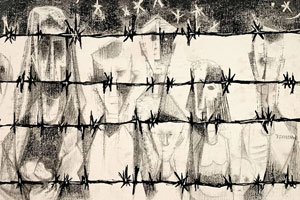4.26.24 — Survivors
Si Lewen was a survivor, and the price of survival was to relive the Holocaust again and again. It was a price he was more than willing to pay.
Lewen relived it sixty-three times in one work alone, the drawings of The Parade—and again in the canvases that he called his Ghosts. A parade can itself mean a procession of events from which there is no escape, like a parade of disasters, his gallery compares Ghosts to shrouds, at James Cohan through April 27. The very fact of repetition can characterize a nightmare, much as Arthur Jafa replays the horrific final shootings in Taxi Driver in his latest video.  And the Holocaust was a nightmare if there ever was one, from which Jews like Lewen are still trying to awake. Yet he was a survivor, again and again, and he took it as his chance to take history back from those who killed. If it can be hard to separate willingness from compulsion, he knew what he wanted.
And the Holocaust was a nightmare if there ever was one, from which Jews like Lewen are still trying to awake. Yet he was a survivor, again and again, and he took it as his chance to take history back from those who killed. If it can be hard to separate willingness from compulsion, he knew what he wanted.
Art Spiegelman met him as a survivor, at age ninety-four, as comfortable as he could possibly have been with his memories. Spiegelman called him “a dynamo: a charming and elfin man, frail but bubbling with enthusiasm, wry humor, and unorthodox opinions. The younger man had come upon The Parade long before and must have felt it as a calling. It has the wit and brutality of his own account of the Holocaust in black and white, Maus, still years away. Its harsh lines and repeated elements anticipate the sheer existence of a graphic novel, in an unnerving mix crayon, ink, pencil, and paint. If a cartoon version of the Holocaust sounds like a sacrilege, neither man was joking.
Lewen had to keep reinventing himself to survive. He escaped Poland as a child and then Germany before it was too late. He joined the U.S Army rather than flee to safety, in a unit that valued his fluency in German language and culture. He participated in the liberation of Buchenwald without flinching, and he saw no need to put the events behind him once and for all. He took up a career that ties observation to action, as an artist. In one last reinvention, the Jew spent his last years in a Quaker home for the aged, where Spiegelman rediscovered him, four years before his death in 2016.
There nobody was marching anymore, but Lewen had lived for the parade. Much of his talent lies in riffing on that theme. He shows a pathetic excuse for a parade, with a German on horseback, and goose-steppers, again parallel to the picture plane. He shifts into depth for a very different procession, of men bearing the weight of coffins, but the parallels are inescapable. Perhaps some of the same victims face out from behind barbed wire, their hunger and terror not yet assuaged by the Americans they witness. This is the pageant that the Nazis demanded but could not control.
Repetition characterizes Ghosts as well, but the dead and living all but vanish. They become a patterning of hash marks within diamonds, with a pattern of their own. They link the series to the jagged line of German Expressionism on the one hand and to the Minimalism of his time in painting on the other. They amount to abstract art (and portions of The Parade approach abstraction as well), but as realism’s ghosts. Still larger work, spanning five panels, screams at the horrors of war like Francisco de Goya. Like the drawings as well, this could be a graphic novel rather than fine art, but not for want of care or provocation.
Two doors down in the gallery’s street-level space, Kaloki Nyamai, too, is and his not playing around, through May 4. He fits with other artists who are working not with African American life or the Afro-Caribbean diaspora, but a return to Africa. Nyamai paints Kenyans at work and play, but it is hard to tell the difference—or to separate figures in action from assorted body parts. Both float in a sea of scribbles and scumbles on acid blue and yellow ground, as Twe Vaa, or “we are here.” He could be asserting his own sense of home or the existence of a people. Either way, you are there, unless you are lost as well.